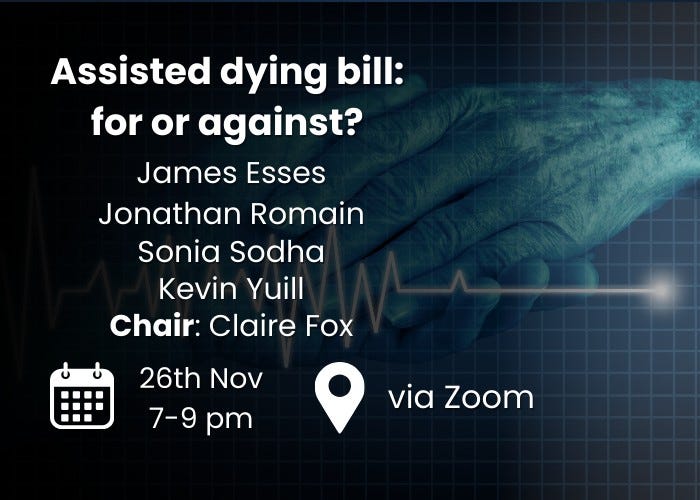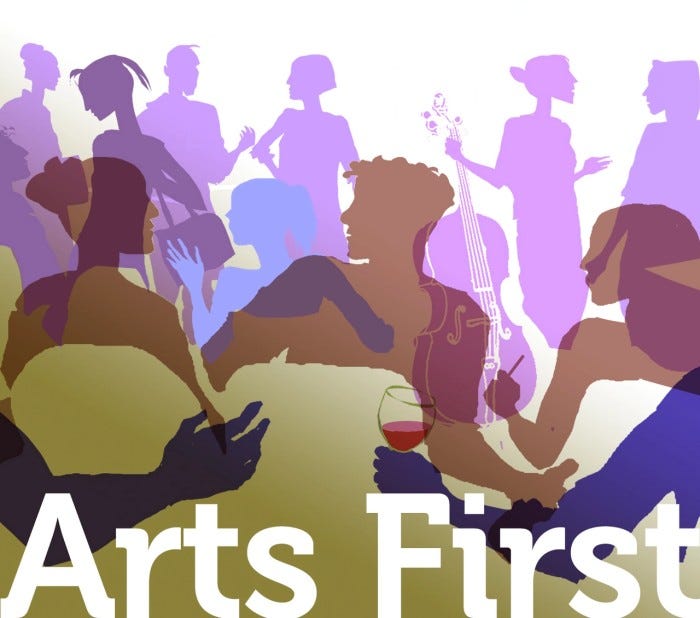Should we legalise assisted dying?
Ahead of the parliamentary vote, join us for a vitally important debate next Tuesday, via Zoom. PLUS the latest episode of Arts First, on the genius of Shakespeare.
Next Friday, 29 November, Parliament will get a long-awaited chance to vote on legalising assisted dying. It is an issue of huge significance, with thorny moral arguments to be had about society’s attitudes to life, bodily autonomy, elderly people and much more. That’s why the Academy of Ideas is hosting an online debate on Tuesday 26 November at 7pm (UK) via Zoom asking whether assisted dying should be legalised.
In support of legalisation we have Rabbi Dr Jonathan Romain MBE, chair of Dignity in Dying, and James Esses, a former criminal barrister and founder of Thoughtful Therapists. Against legalisation we have Sonia Sodha, an Observer/Guardian columnist and leader writer, and Professor Kevin Yuill, author of Assisted Suicide: the liberal, humanist case against legalization. I will be chairing the debate. The event is free of charge. Find out more and register here.
Background
While assisted dying has been legalised in recent years in several countries and states – including Netherlands, Belgium, Canada and Oregon - it is currently illegal in the UK. The proposed legislation would make an exception on request for patients with six months left to live, with permission from two medical professionals and a judge. The bill's author, Kim Leadbeater MP, presents assisted dying as a matter of free choice and dignity, and argues that those without the option will take the situation into their own hands, causing unnecessary distress for those around them. Prime Minister Keir Starmer is an enthusiastic supporter of the Bill, having supported the previous attempt at legalisation back in 2015.
But there are high-profile opponents of legalisation, too, most notably the health secretary, Wes Streeting. There are concerns that the Bill will not guard effectively against situations in which people are coerced to die, either by family members or by a state that is too often incapable of providing adequate palliative care. Moreover, despite protestations from Leadbeater and others, there are concerns about a ‘slippery slope’ where the exemption is broadened out to other groups – from those with depression to elderly people who require a lot of health and social care, but are not terminally ill. That has certainly been the experience in other countries.
Is the current law a ‘cruel mess,’ to quote campaigner Dame Esther Rantzen – or is it necessary to prevent slippery slopes? Could the interests of our welfare state undermine the Bill’s protections? And how should we square a patient’s freedom of choice with existing frameworks of medical ethics?
I hope to see you on Tuesday. If you would like to join us, register here.
Claire
Arts First: The Genius of Shakespeare
Wendy Earle
Attending the annual Academy conference in August this year, I listened to a lecture by comedian and GB News presenter, Andrew Doyle and immediately knew I had to invite him to join us on the Arts First podcast. His exposition of why Shakespeare remains such an important figure in the literary firmament was compelling.
This is the tenth episode of our podcast and I think it’s the best yet. It exemplifies what is so important about the arts as a sphere of free thinking and expression, a central arena for the creation of beauty and ‘the best which has been thought and said in the world’, as Matthew Arnold put it.
In conversation with Alka Sehgal-Cuthbert, Richard Woolfenden and Jane Sandeman, all aficionados of Shakespeare’s plays, Andrew eloquently elaborates on how Shakespeare astutely and poetically synthesised the universal and eternal human condition in all its variety, mess and complexity. Alka, Jane and Richard pick up on the theme that there is something uniquely open about Shakespeare’s plays: they can be reinterpreted for any period in which they are performed, to address the concerns of the day. At the same time, they defy the fragmentary dynamic and narrow ideologising of contemporary identity politics.
Find out more and listen to the episode on the Arts First Substack.



